Cultural Analysis: How News Media Represents Islam in the UK?
VerifiedAdded on 2024/05/17
|13
|4023
|252
Essay
AI Summary
This essay explores the representation of Islam in the UK news media through a cultural sociology lens. It examines the background of racism and Islamophobia, highlighting how media coverage often portrays Muslims negatively, contributing to social misrepresentation and discrimination. The essay references various studies and reports that discuss the impact of media portrayals on British Muslims, the rise of Islamophobic sentiments, and the challenges faced by the Muslim community in the UK. It also touches upon the role of print media in shaping public perception and the importance of addressing inaccurate reporting. The analysis emphasizes the need for a more balanced and ethical representation of Islam in the media to foster better understanding and integration within British society. Desklib offers a variety of resources, including past papers and solved assignments, to support students in their academic endeavors.
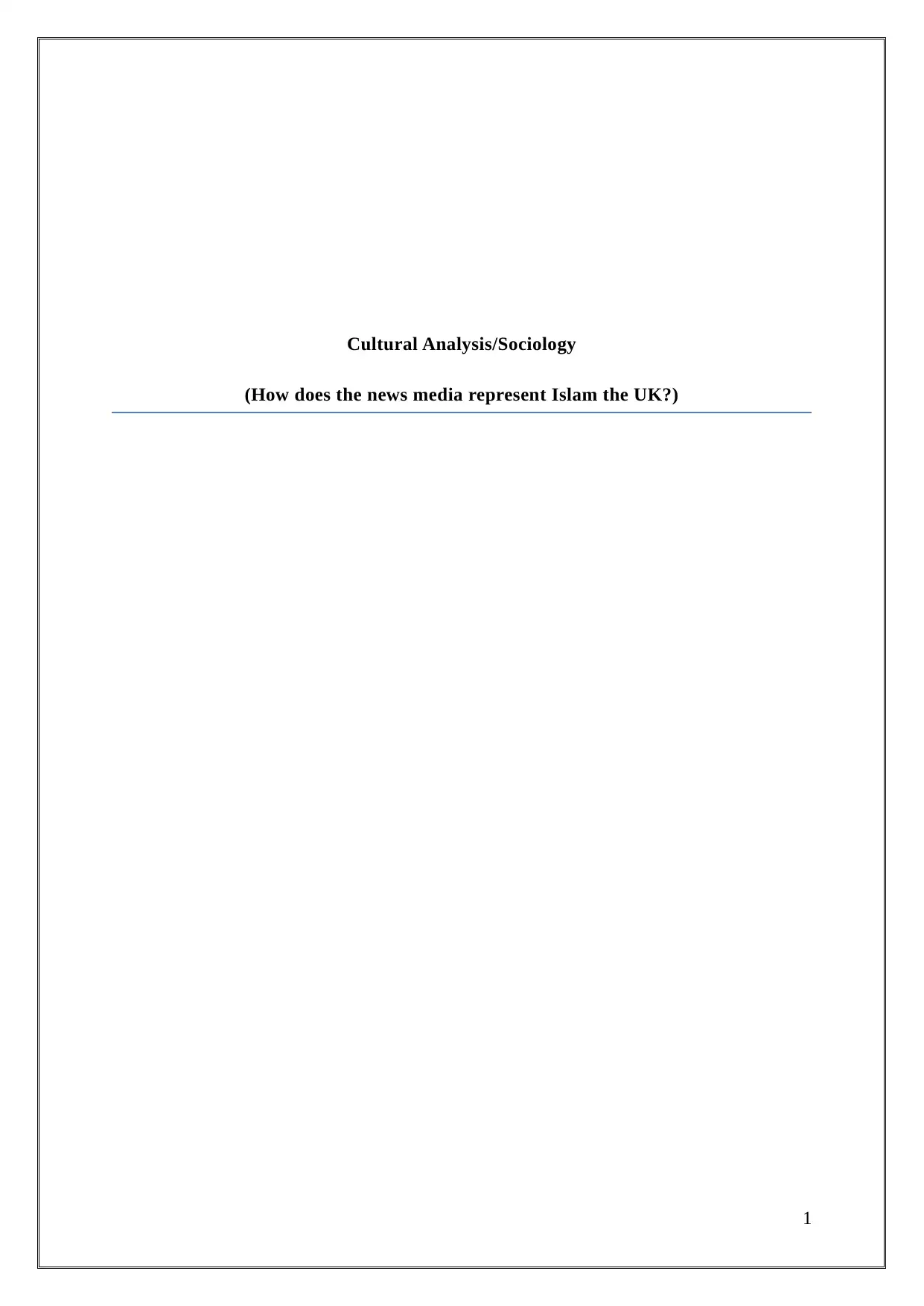
Cultural Analysis/Sociology
(How does the news media represent Islam the UK?)
1
(How does the news media represent Islam the UK?)
1
Paraphrase This Document
Need a fresh take? Get an instant paraphrase of this document with our AI Paraphraser
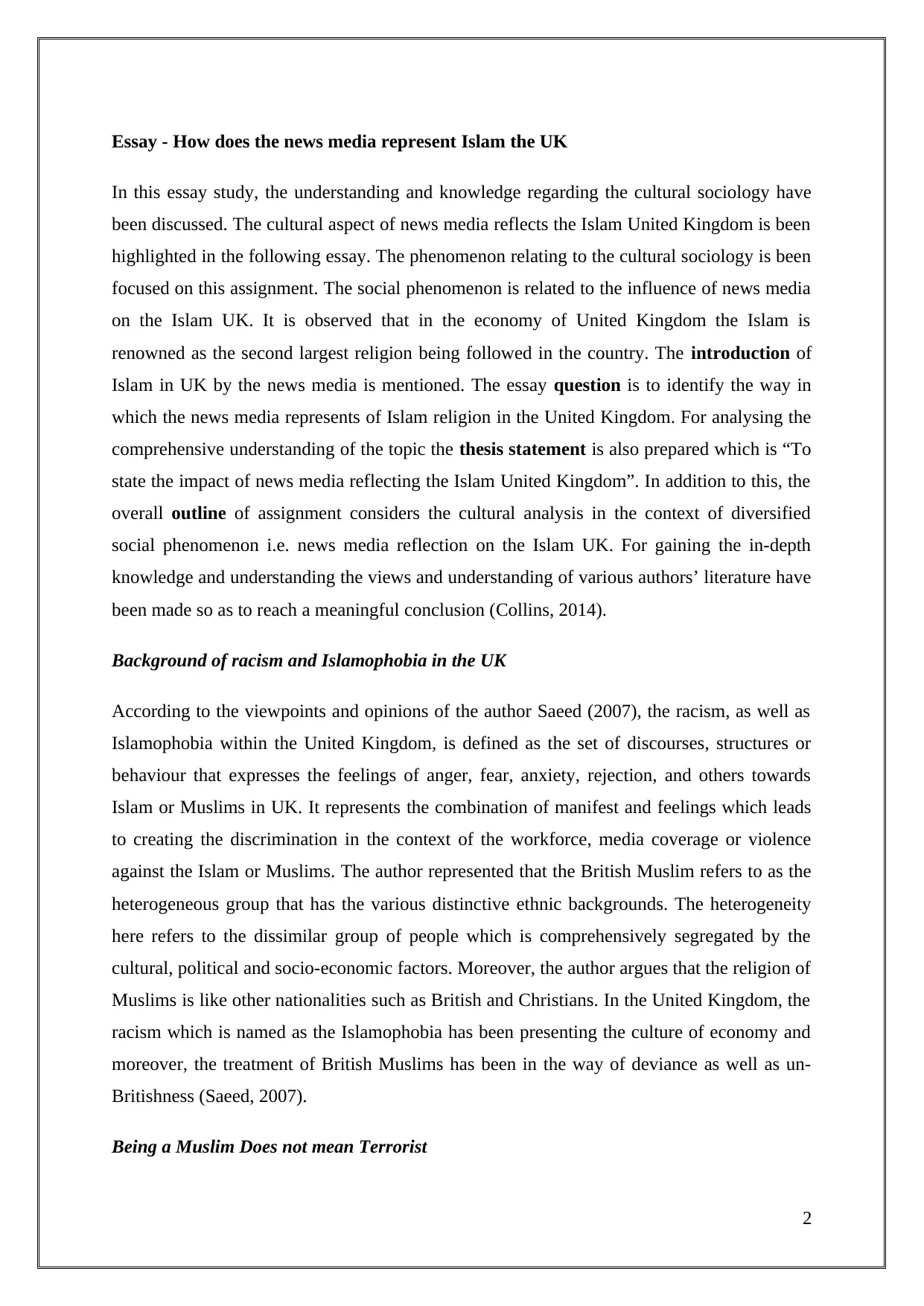
Essay - How does the news media represent Islam the UK
In this essay study, the understanding and knowledge regarding the cultural sociology have
been discussed. The cultural aspect of news media reflects the Islam United Kingdom is been
highlighted in the following essay. The phenomenon relating to the cultural sociology is been
focused on this assignment. The social phenomenon is related to the influence of news media
on the Islam UK. It is observed that in the economy of United Kingdom the Islam is
renowned as the second largest religion being followed in the country. The introduction of
Islam in UK by the news media is mentioned. The essay question is to identify the way in
which the news media represents of Islam religion in the United Kingdom. For analysing the
comprehensive understanding of the topic the thesis statement is also prepared which is “To
state the impact of news media reflecting the Islam United Kingdom”. In addition to this, the
overall outline of assignment considers the cultural analysis in the context of diversified
social phenomenon i.e. news media reflection on the Islam UK. For gaining the in-depth
knowledge and understanding the views and understanding of various authors’ literature have
been made so as to reach a meaningful conclusion (Collins, 2014).
Background of racism and Islamophobia in the UK
According to the viewpoints and opinions of the author Saeed (2007), the racism, as well as
Islamophobia within the United Kingdom, is defined as the set of discourses, structures or
behaviour that expresses the feelings of anger, fear, anxiety, rejection, and others towards
Islam or Muslims in UK. It represents the combination of manifest and feelings which leads
to creating the discrimination in the context of the workforce, media coverage or violence
against the Islam or Muslims. The author represented that the British Muslim refers to as the
heterogeneous group that has the various distinctive ethnic backgrounds. The heterogeneity
here refers to the dissimilar group of people which is comprehensively segregated by the
cultural, political and socio-economic factors. Moreover, the author argues that the religion of
Muslims is like other nationalities such as British and Christians. In the United Kingdom, the
racism which is named as the Islamophobia has been presenting the culture of economy and
moreover, the treatment of British Muslims has been in the way of deviance as well as un-
Britishness (Saeed, 2007).
Being a Muslim Does not mean Terrorist
2
In this essay study, the understanding and knowledge regarding the cultural sociology have
been discussed. The cultural aspect of news media reflects the Islam United Kingdom is been
highlighted in the following essay. The phenomenon relating to the cultural sociology is been
focused on this assignment. The social phenomenon is related to the influence of news media
on the Islam UK. It is observed that in the economy of United Kingdom the Islam is
renowned as the second largest religion being followed in the country. The introduction of
Islam in UK by the news media is mentioned. The essay question is to identify the way in
which the news media represents of Islam religion in the United Kingdom. For analysing the
comprehensive understanding of the topic the thesis statement is also prepared which is “To
state the impact of news media reflecting the Islam United Kingdom”. In addition to this, the
overall outline of assignment considers the cultural analysis in the context of diversified
social phenomenon i.e. news media reflection on the Islam UK. For gaining the in-depth
knowledge and understanding the views and understanding of various authors’ literature have
been made so as to reach a meaningful conclusion (Collins, 2014).
Background of racism and Islamophobia in the UK
According to the viewpoints and opinions of the author Saeed (2007), the racism, as well as
Islamophobia within the United Kingdom, is defined as the set of discourses, structures or
behaviour that expresses the feelings of anger, fear, anxiety, rejection, and others towards
Islam or Muslims in UK. It represents the combination of manifest and feelings which leads
to creating the discrimination in the context of the workforce, media coverage or violence
against the Islam or Muslims. The author represented that the British Muslim refers to as the
heterogeneous group that has the various distinctive ethnic backgrounds. The heterogeneity
here refers to the dissimilar group of people which is comprehensively segregated by the
cultural, political and socio-economic factors. Moreover, the author argues that the religion of
Muslims is like other nationalities such as British and Christians. In the United Kingdom, the
racism which is named as the Islamophobia has been presenting the culture of economy and
moreover, the treatment of British Muslims has been in the way of deviance as well as un-
Britishness (Saeed, 2007).
Being a Muslim Does not mean Terrorist
2
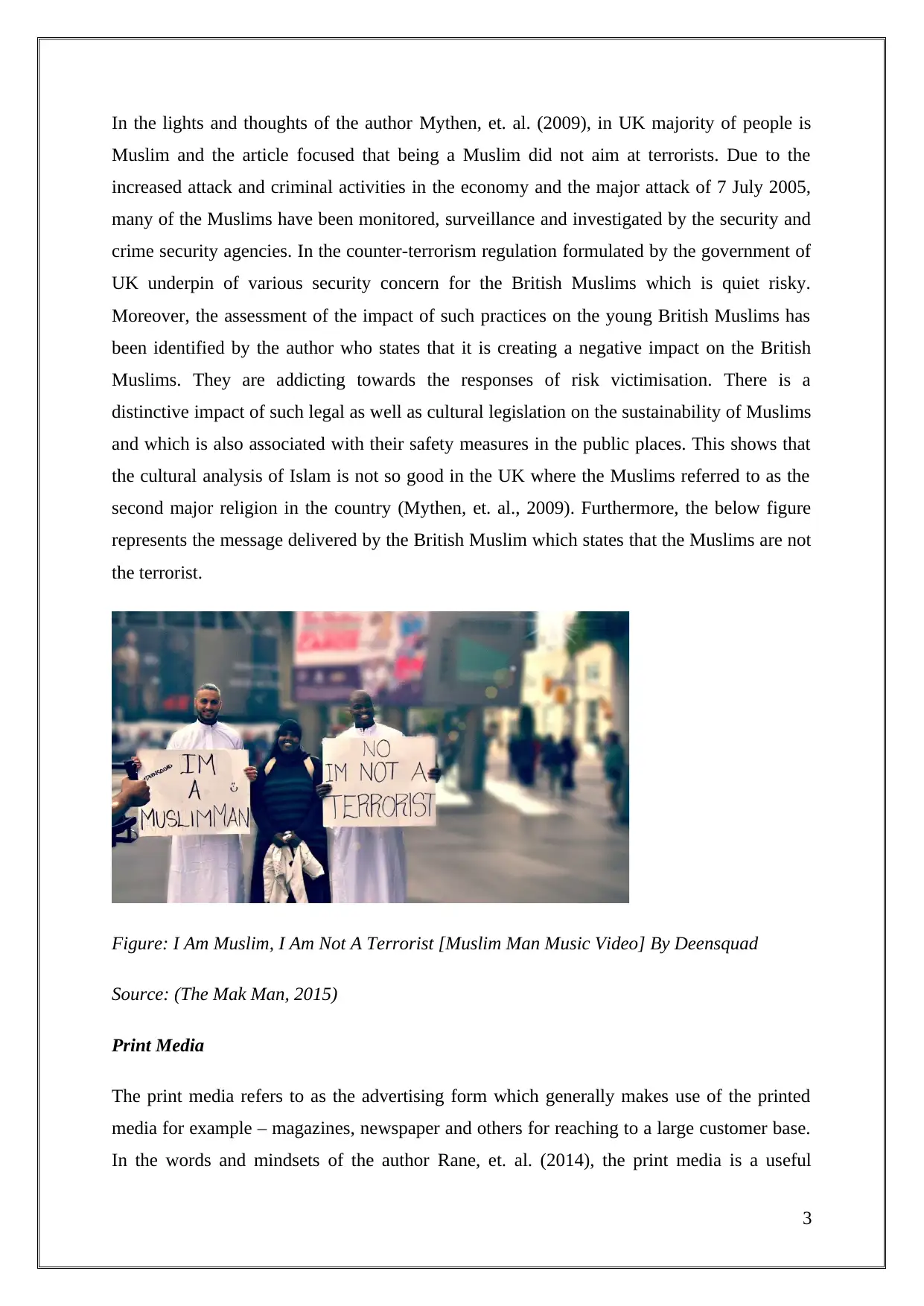
In the lights and thoughts of the author Mythen, et. al. (2009), in UK majority of people is
Muslim and the article focused that being a Muslim did not aim at terrorists. Due to the
increased attack and criminal activities in the economy and the major attack of 7 July 2005,
many of the Muslims have been monitored, surveillance and investigated by the security and
crime security agencies. In the counter-terrorism regulation formulated by the government of
UK underpin of various security concern for the British Muslims which is quiet risky.
Moreover, the assessment of the impact of such practices on the young British Muslims has
been identified by the author who states that it is creating a negative impact on the British
Muslims. They are addicting towards the responses of risk victimisation. There is a
distinctive impact of such legal as well as cultural legislation on the sustainability of Muslims
and which is also associated with their safety measures in the public places. This shows that
the cultural analysis of Islam is not so good in the UK where the Muslims referred to as the
second major religion in the country (Mythen, et. al., 2009). Furthermore, the below figure
represents the message delivered by the British Muslim which states that the Muslims are not
the terrorist.
Figure: I Am Muslim, I Am Not A Terrorist [Muslim Man Music Video] By Deensquad
Source: (The Mak Man, 2015)
Print Media
The print media refers to as the advertising form which generally makes use of the printed
media for example – magazines, newspaper and others for reaching to a large customer base.
In the words and mindsets of the author Rane, et. al. (2014), the print media is a useful
3
Muslim and the article focused that being a Muslim did not aim at terrorists. Due to the
increased attack and criminal activities in the economy and the major attack of 7 July 2005,
many of the Muslims have been monitored, surveillance and investigated by the security and
crime security agencies. In the counter-terrorism regulation formulated by the government of
UK underpin of various security concern for the British Muslims which is quiet risky.
Moreover, the assessment of the impact of such practices on the young British Muslims has
been identified by the author who states that it is creating a negative impact on the British
Muslims. They are addicting towards the responses of risk victimisation. There is a
distinctive impact of such legal as well as cultural legislation on the sustainability of Muslims
and which is also associated with their safety measures in the public places. This shows that
the cultural analysis of Islam is not so good in the UK where the Muslims referred to as the
second major religion in the country (Mythen, et. al., 2009). Furthermore, the below figure
represents the message delivered by the British Muslim which states that the Muslims are not
the terrorist.
Figure: I Am Muslim, I Am Not A Terrorist [Muslim Man Music Video] By Deensquad
Source: (The Mak Man, 2015)
Print Media
The print media refers to as the advertising form which generally makes use of the printed
media for example – magazines, newspaper and others for reaching to a large customer base.
In the words and mindsets of the author Rane, et. al. (2014), the print media is a useful
3
⊘ This is a preview!⊘
Do you want full access?
Subscribe today to unlock all pages.

Trusted by 1+ million students worldwide
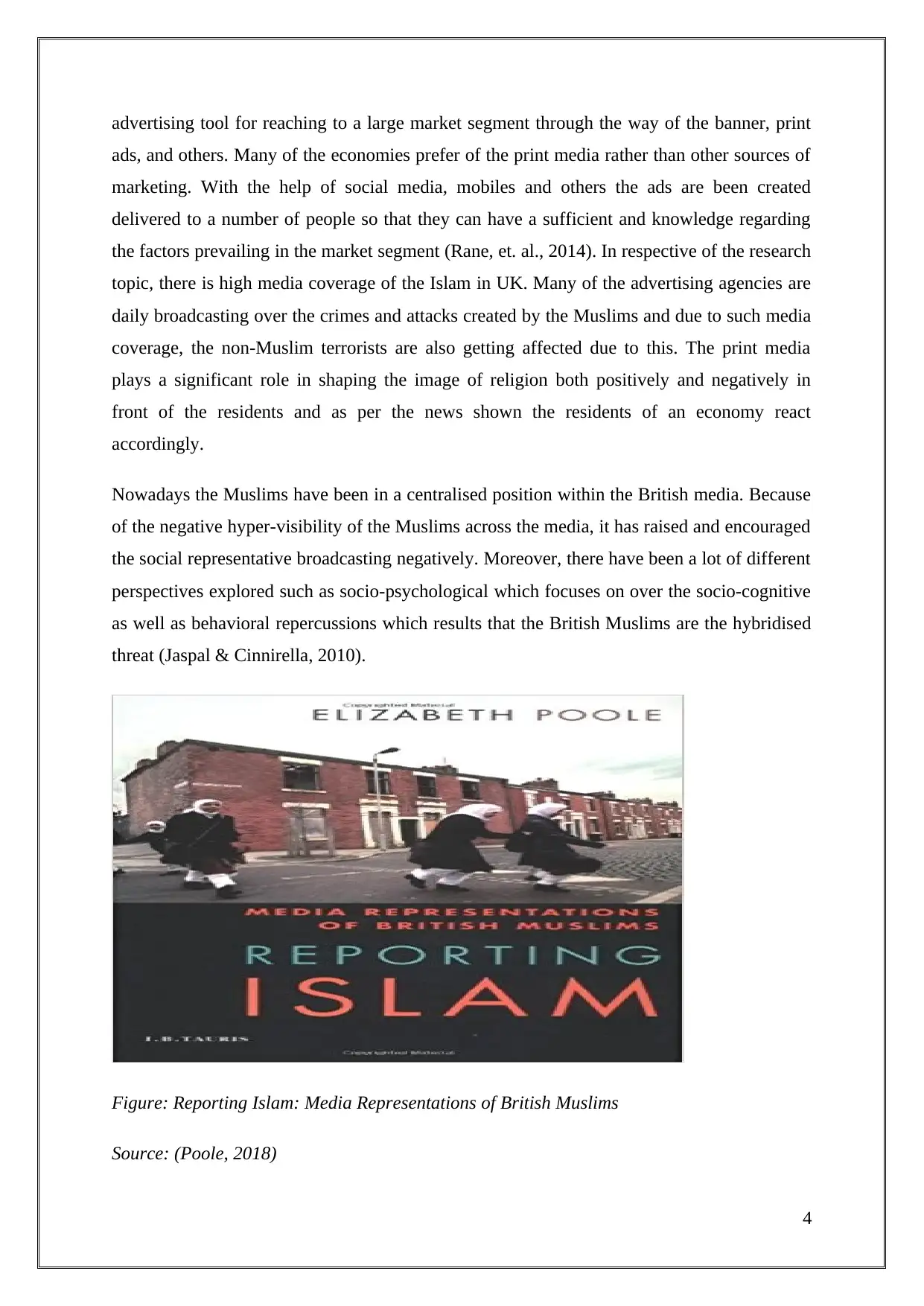
advertising tool for reaching to a large market segment through the way of the banner, print
ads, and others. Many of the economies prefer of the print media rather than other sources of
marketing. With the help of social media, mobiles and others the ads are been created
delivered to a number of people so that they can have a sufficient and knowledge regarding
the factors prevailing in the market segment (Rane, et. al., 2014). In respective of the research
topic, there is high media coverage of the Islam in UK. Many of the advertising agencies are
daily broadcasting over the crimes and attacks created by the Muslims and due to such media
coverage, the non-Muslim terrorists are also getting affected due to this. The print media
plays a significant role in shaping the image of religion both positively and negatively in
front of the residents and as per the news shown the residents of an economy react
accordingly.
Nowadays the Muslims have been in a centralised position within the British media. Because
of the negative hyper-visibility of the Muslims across the media, it has raised and encouraged
the social representative broadcasting negatively. Moreover, there have been a lot of different
perspectives explored such as socio-psychological which focuses on over the socio-cognitive
as well as behavioral repercussions which results that the British Muslims are the hybridised
threat (Jaspal & Cinnirella, 2010).
Figure: Reporting Islam: Media Representations of British Muslims
Source: (Poole, 2018)
4
ads, and others. Many of the economies prefer of the print media rather than other sources of
marketing. With the help of social media, mobiles and others the ads are been created
delivered to a number of people so that they can have a sufficient and knowledge regarding
the factors prevailing in the market segment (Rane, et. al., 2014). In respective of the research
topic, there is high media coverage of the Islam in UK. Many of the advertising agencies are
daily broadcasting over the crimes and attacks created by the Muslims and due to such media
coverage, the non-Muslim terrorists are also getting affected due to this. The print media
plays a significant role in shaping the image of religion both positively and negatively in
front of the residents and as per the news shown the residents of an economy react
accordingly.
Nowadays the Muslims have been in a centralised position within the British media. Because
of the negative hyper-visibility of the Muslims across the media, it has raised and encouraged
the social representative broadcasting negatively. Moreover, there have been a lot of different
perspectives explored such as socio-psychological which focuses on over the socio-cognitive
as well as behavioral repercussions which results that the British Muslims are the hybridised
threat (Jaspal & Cinnirella, 2010).
Figure: Reporting Islam: Media Representations of British Muslims
Source: (Poole, 2018)
4
Paraphrase This Document
Need a fresh take? Get an instant paraphrase of this document with our AI Paraphraser
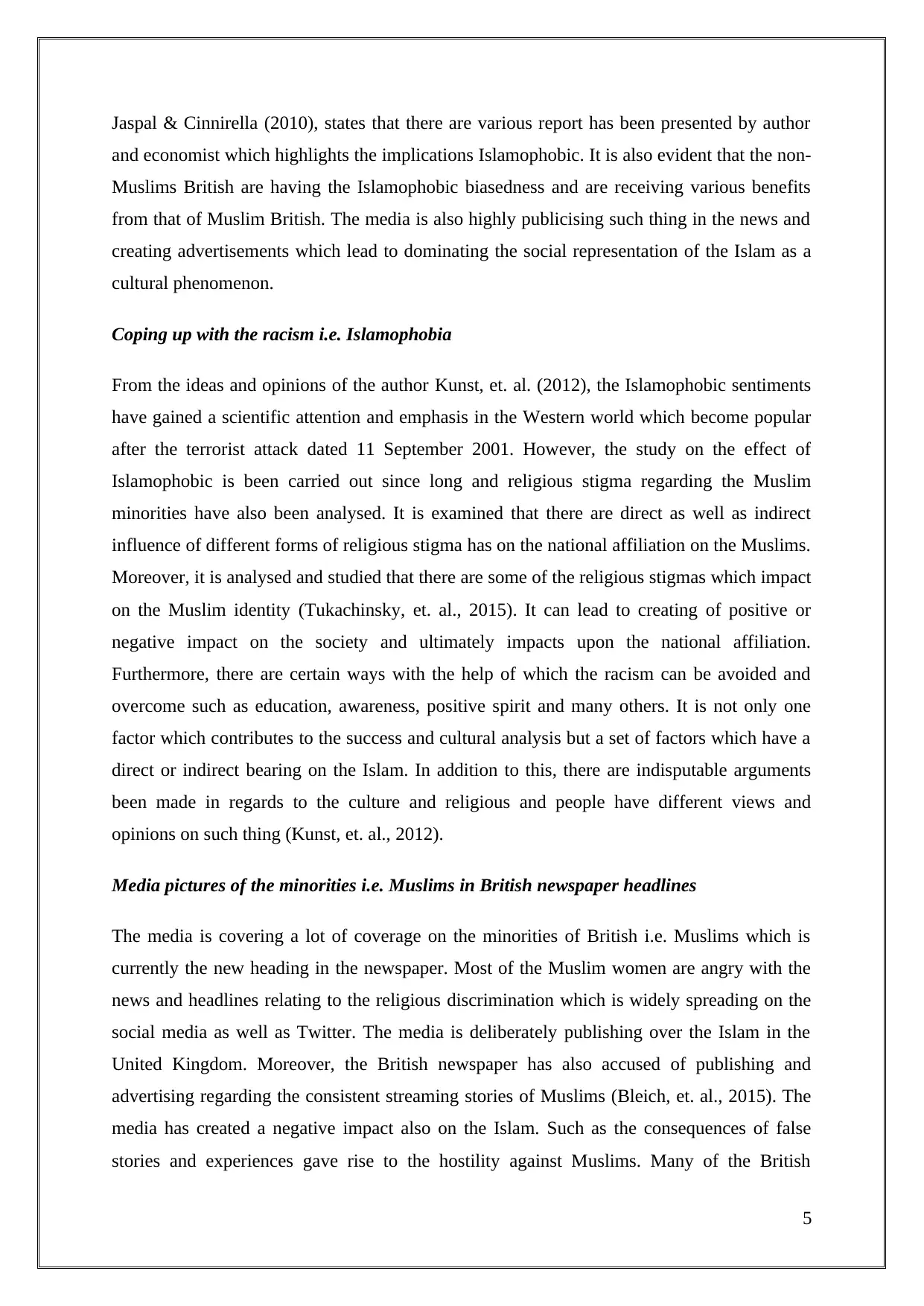
Jaspal & Cinnirella (2010), states that there are various report has been presented by author
and economist which highlights the implications Islamophobic. It is also evident that the non-
Muslims British are having the Islamophobic biasedness and are receiving various benefits
from that of Muslim British. The media is also highly publicising such thing in the news and
creating advertisements which lead to dominating the social representation of the Islam as a
cultural phenomenon.
Coping up with the racism i.e. Islamophobia
From the ideas and opinions of the author Kunst, et. al. (2012), the Islamophobic sentiments
have gained a scientific attention and emphasis in the Western world which become popular
after the terrorist attack dated 11 September 2001. However, the study on the effect of
Islamophobic is been carried out since long and religious stigma regarding the Muslim
minorities have also been analysed. It is examined that there are direct as well as indirect
influence of different forms of religious stigma has on the national affiliation on the Muslims.
Moreover, it is analysed and studied that there are some of the religious stigmas which impact
on the Muslim identity (Tukachinsky, et. al., 2015). It can lead to creating of positive or
negative impact on the society and ultimately impacts upon the national affiliation.
Furthermore, there are certain ways with the help of which the racism can be avoided and
overcome such as education, awareness, positive spirit and many others. It is not only one
factor which contributes to the success and cultural analysis but a set of factors which have a
direct or indirect bearing on the Islam. In addition to this, there are indisputable arguments
been made in regards to the culture and religious and people have different views and
opinions on such thing (Kunst, et. al., 2012).
Media pictures of the minorities i.e. Muslims in British newspaper headlines
The media is covering a lot of coverage on the minorities of British i.e. Muslims which is
currently the new heading in the newspaper. Most of the Muslim women are angry with the
news and headlines relating to the religious discrimination which is widely spreading on the
social media as well as Twitter. The media is deliberately publishing over the Islam in the
United Kingdom. Moreover, the British newspaper has also accused of publishing and
advertising regarding the consistent streaming stories of Muslims (Bleich, et. al., 2015). The
media has created a negative impact also on the Islam. Such as the consequences of false
stories and experiences gave rise to the hostility against Muslims. Many of the British
5
and economist which highlights the implications Islamophobic. It is also evident that the non-
Muslims British are having the Islamophobic biasedness and are receiving various benefits
from that of Muslim British. The media is also highly publicising such thing in the news and
creating advertisements which lead to dominating the social representation of the Islam as a
cultural phenomenon.
Coping up with the racism i.e. Islamophobia
From the ideas and opinions of the author Kunst, et. al. (2012), the Islamophobic sentiments
have gained a scientific attention and emphasis in the Western world which become popular
after the terrorist attack dated 11 September 2001. However, the study on the effect of
Islamophobic is been carried out since long and religious stigma regarding the Muslim
minorities have also been analysed. It is examined that there are direct as well as indirect
influence of different forms of religious stigma has on the national affiliation on the Muslims.
Moreover, it is analysed and studied that there are some of the religious stigmas which impact
on the Muslim identity (Tukachinsky, et. al., 2015). It can lead to creating of positive or
negative impact on the society and ultimately impacts upon the national affiliation.
Furthermore, there are certain ways with the help of which the racism can be avoided and
overcome such as education, awareness, positive spirit and many others. It is not only one
factor which contributes to the success and cultural analysis but a set of factors which have a
direct or indirect bearing on the Islam. In addition to this, there are indisputable arguments
been made in regards to the culture and religious and people have different views and
opinions on such thing (Kunst, et. al., 2012).
Media pictures of the minorities i.e. Muslims in British newspaper headlines
The media is covering a lot of coverage on the minorities of British i.e. Muslims which is
currently the new heading in the newspaper. Most of the Muslim women are angry with the
news and headlines relating to the religious discrimination which is widely spreading on the
social media as well as Twitter. The media is deliberately publishing over the Islam in the
United Kingdom. Moreover, the British newspaper has also accused of publishing and
advertising regarding the consistent streaming stories of Muslims (Bleich, et. al., 2015). The
media has created a negative impact also on the Islam. Such as the consequences of false
stories and experiences gave rise to the hostility against Muslims. Many of the British
5
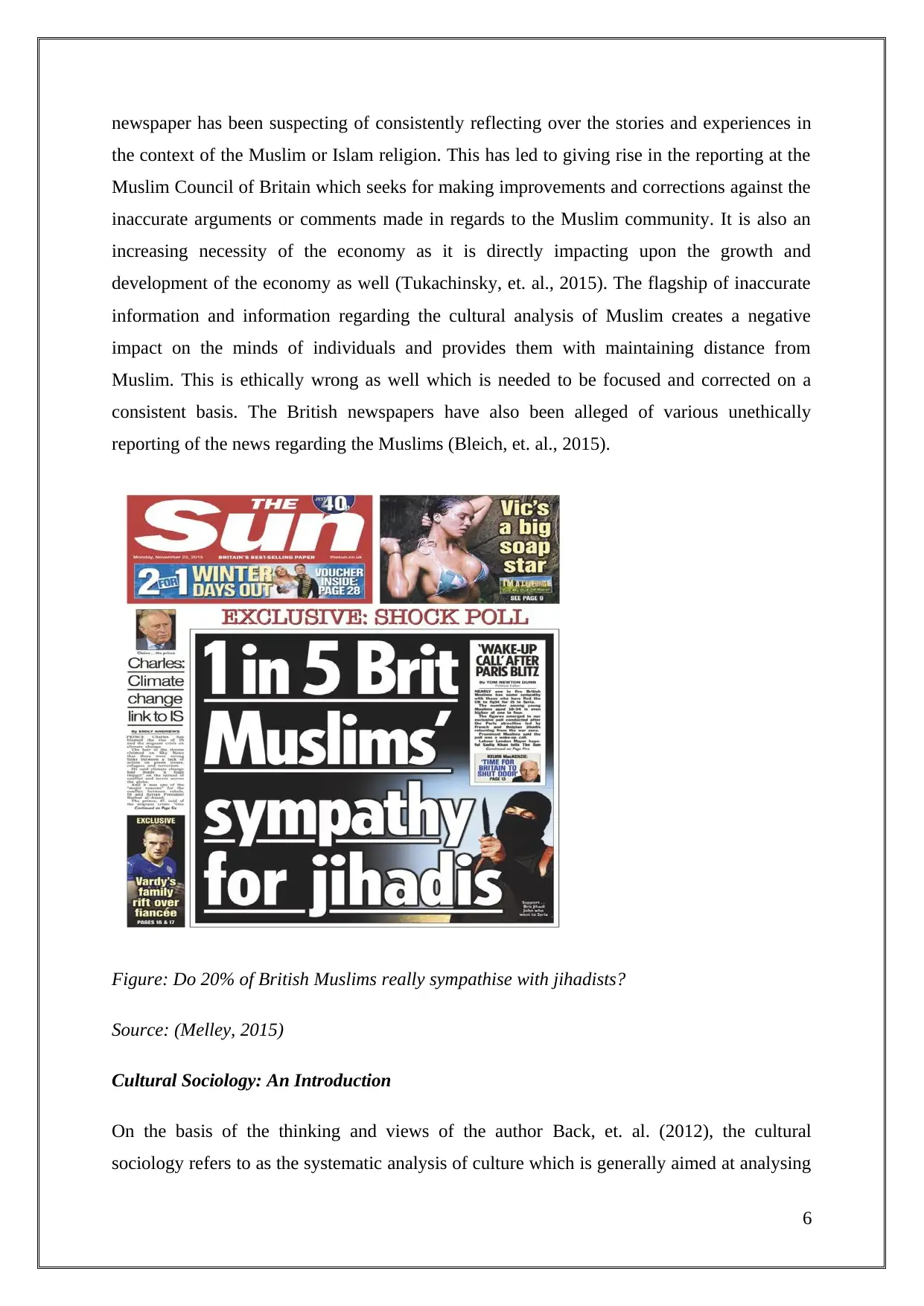
newspaper has been suspecting of consistently reflecting over the stories and experiences in
the context of the Muslim or Islam religion. This has led to giving rise in the reporting at the
Muslim Council of Britain which seeks for making improvements and corrections against the
inaccurate arguments or comments made in regards to the Muslim community. It is also an
increasing necessity of the economy as it is directly impacting upon the growth and
development of the economy as well (Tukachinsky, et. al., 2015). The flagship of inaccurate
information and information regarding the cultural analysis of Muslim creates a negative
impact on the minds of individuals and provides them with maintaining distance from
Muslim. This is ethically wrong as well which is needed to be focused and corrected on a
consistent basis. The British newspapers have also been alleged of various unethically
reporting of the news regarding the Muslims (Bleich, et. al., 2015).
Figure: Do 20% of British Muslims really sympathise with jihadists?
Source: (Melley, 2015)
Cultural Sociology: An Introduction
On the basis of the thinking and views of the author Back, et. al. (2012), the cultural
sociology refers to as the systematic analysis of culture which is generally aimed at analysing
6
the context of the Muslim or Islam religion. This has led to giving rise in the reporting at the
Muslim Council of Britain which seeks for making improvements and corrections against the
inaccurate arguments or comments made in regards to the Muslim community. It is also an
increasing necessity of the economy as it is directly impacting upon the growth and
development of the economy as well (Tukachinsky, et. al., 2015). The flagship of inaccurate
information and information regarding the cultural analysis of Muslim creates a negative
impact on the minds of individuals and provides them with maintaining distance from
Muslim. This is ethically wrong as well which is needed to be focused and corrected on a
consistent basis. The British newspapers have also been alleged of various unethically
reporting of the news regarding the Muslims (Bleich, et. al., 2015).
Figure: Do 20% of British Muslims really sympathise with jihadists?
Source: (Melley, 2015)
Cultural Sociology: An Introduction
On the basis of the thinking and views of the author Back, et. al. (2012), the cultural
sociology refers to as the systematic analysis of culture which is generally aimed at analysing
6
⊘ This is a preview!⊘
Do you want full access?
Subscribe today to unlock all pages.

Trusted by 1+ million students worldwide
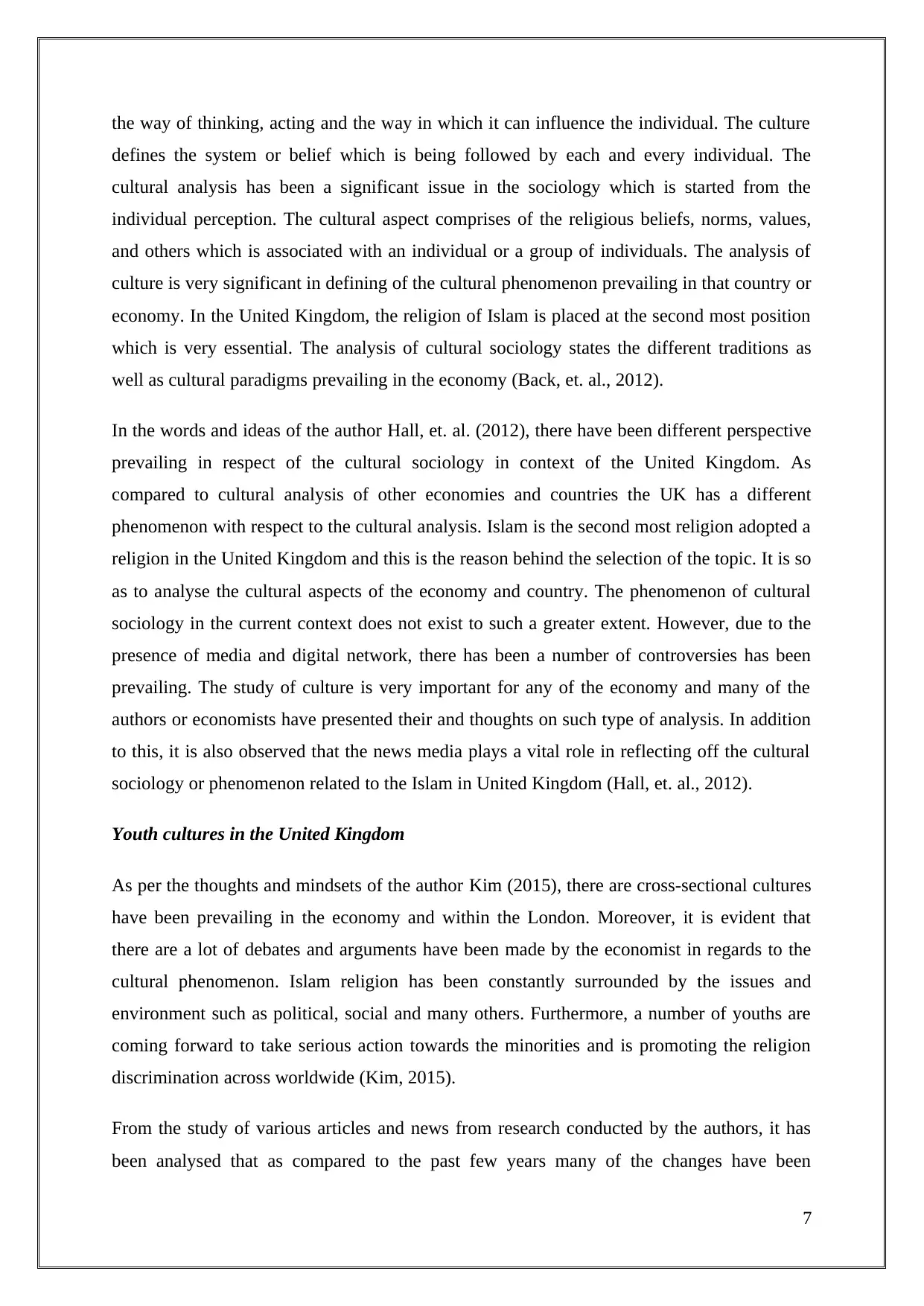
the way of thinking, acting and the way in which it can influence the individual. The culture
defines the system or belief which is being followed by each and every individual. The
cultural analysis has been a significant issue in the sociology which is started from the
individual perception. The cultural aspect comprises of the religious beliefs, norms, values,
and others which is associated with an individual or a group of individuals. The analysis of
culture is very significant in defining of the cultural phenomenon prevailing in that country or
economy. In the United Kingdom, the religion of Islam is placed at the second most position
which is very essential. The analysis of cultural sociology states the different traditions as
well as cultural paradigms prevailing in the economy (Back, et. al., 2012).
In the words and ideas of the author Hall, et. al. (2012), there have been different perspective
prevailing in respect of the cultural sociology in context of the United Kingdom. As
compared to cultural analysis of other economies and countries the UK has a different
phenomenon with respect to the cultural analysis. Islam is the second most religion adopted a
religion in the United Kingdom and this is the reason behind the selection of the topic. It is so
as to analyse the cultural aspects of the economy and country. The phenomenon of cultural
sociology in the current context does not exist to such a greater extent. However, due to the
presence of media and digital network, there has been a number of controversies has been
prevailing. The study of culture is very important for any of the economy and many of the
authors or economists have presented their and thoughts on such type of analysis. In addition
to this, it is also observed that the news media plays a vital role in reflecting off the cultural
sociology or phenomenon related to the Islam in United Kingdom (Hall, et. al., 2012).
Youth cultures in the United Kingdom
As per the thoughts and mindsets of the author Kim (2015), there are cross-sectional cultures
have been prevailing in the economy and within the London. Moreover, it is evident that
there are a lot of debates and arguments have been made by the economist in regards to the
cultural phenomenon. Islam religion has been constantly surrounded by the issues and
environment such as political, social and many others. Furthermore, a number of youths are
coming forward to take serious action towards the minorities and is promoting the religion
discrimination across worldwide (Kim, 2015).
From the study of various articles and news from research conducted by the authors, it has
been analysed that as compared to the past few years many of the changes have been
7
defines the system or belief which is being followed by each and every individual. The
cultural analysis has been a significant issue in the sociology which is started from the
individual perception. The cultural aspect comprises of the religious beliefs, norms, values,
and others which is associated with an individual or a group of individuals. The analysis of
culture is very significant in defining of the cultural phenomenon prevailing in that country or
economy. In the United Kingdom, the religion of Islam is placed at the second most position
which is very essential. The analysis of cultural sociology states the different traditions as
well as cultural paradigms prevailing in the economy (Back, et. al., 2012).
In the words and ideas of the author Hall, et. al. (2012), there have been different perspective
prevailing in respect of the cultural sociology in context of the United Kingdom. As
compared to cultural analysis of other economies and countries the UK has a different
phenomenon with respect to the cultural analysis. Islam is the second most religion adopted a
religion in the United Kingdom and this is the reason behind the selection of the topic. It is so
as to analyse the cultural aspects of the economy and country. The phenomenon of cultural
sociology in the current context does not exist to such a greater extent. However, due to the
presence of media and digital network, there has been a number of controversies has been
prevailing. The study of culture is very important for any of the economy and many of the
authors or economists have presented their and thoughts on such type of analysis. In addition
to this, it is also observed that the news media plays a vital role in reflecting off the cultural
sociology or phenomenon related to the Islam in United Kingdom (Hall, et. al., 2012).
Youth cultures in the United Kingdom
As per the thoughts and mindsets of the author Kim (2015), there are cross-sectional cultures
have been prevailing in the economy and within the London. Moreover, it is evident that
there are a lot of debates and arguments have been made by the economist in regards to the
cultural phenomenon. Islam religion has been constantly surrounded by the issues and
environment such as political, social and many others. Furthermore, a number of youths are
coming forward to take serious action towards the minorities and is promoting the religion
discrimination across worldwide (Kim, 2015).
From the study of various articles and news from research conducted by the authors, it has
been analysed that as compared to the past few years many of the changes have been
7
Paraphrase This Document
Need a fresh take? Get an instant paraphrase of this document with our AI Paraphraser
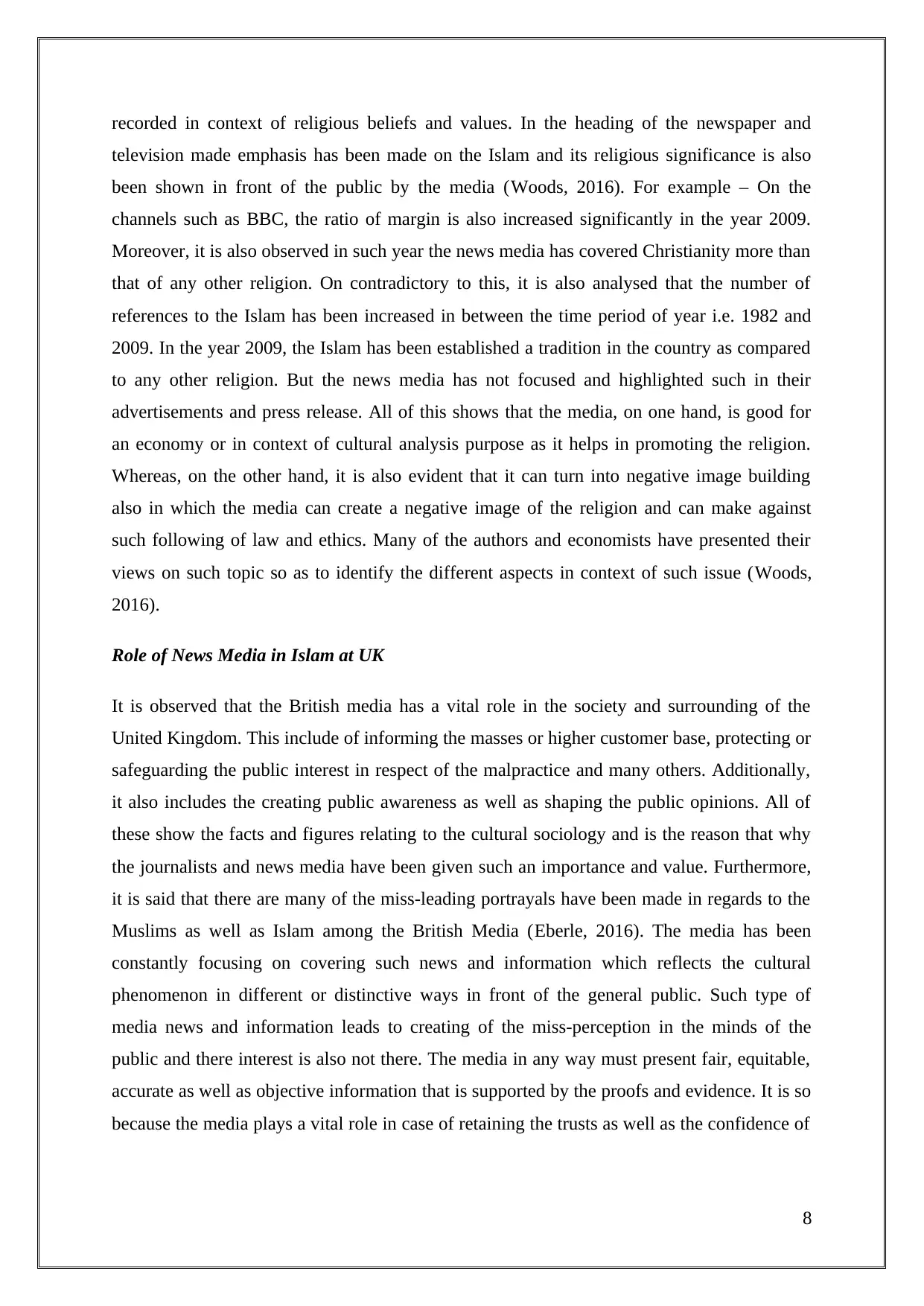
recorded in context of religious beliefs and values. In the heading of the newspaper and
television made emphasis has been made on the Islam and its religious significance is also
been shown in front of the public by the media (Woods, 2016). For example – On the
channels such as BBC, the ratio of margin is also increased significantly in the year 2009.
Moreover, it is also observed in such year the news media has covered Christianity more than
that of any other religion. On contradictory to this, it is also analysed that the number of
references to the Islam has been increased in between the time period of year i.e. 1982 and
2009. In the year 2009, the Islam has been established a tradition in the country as compared
to any other religion. But the news media has not focused and highlighted such in their
advertisements and press release. All of this shows that the media, on one hand, is good for
an economy or in context of cultural analysis purpose as it helps in promoting the religion.
Whereas, on the other hand, it is also evident that it can turn into negative image building
also in which the media can create a negative image of the religion and can make against
such following of law and ethics. Many of the authors and economists have presented their
views on such topic so as to identify the different aspects in context of such issue (Woods,
2016).
Role of News Media in Islam at UK
It is observed that the British media has a vital role in the society and surrounding of the
United Kingdom. This include of informing the masses or higher customer base, protecting or
safeguarding the public interest in respect of the malpractice and many others. Additionally,
it also includes the creating public awareness as well as shaping the public opinions. All of
these show the facts and figures relating to the cultural sociology and is the reason that why
the journalists and news media have been given such an importance and value. Furthermore,
it is said that there are many of the miss-leading portrayals have been made in regards to the
Muslims as well as Islam among the British Media (Eberle, 2016). The media has been
constantly focusing on covering such news and information which reflects the cultural
phenomenon in different or distinctive ways in front of the general public. Such type of
media news and information leads to creating of the miss-perception in the minds of the
public and there interest is also not there. The media in any way must present fair, equitable,
accurate as well as objective information that is supported by the proofs and evidence. It is so
because the media plays a vital role in case of retaining the trusts as well as the confidence of
8
television made emphasis has been made on the Islam and its religious significance is also
been shown in front of the public by the media (Woods, 2016). For example – On the
channels such as BBC, the ratio of margin is also increased significantly in the year 2009.
Moreover, it is also observed in such year the news media has covered Christianity more than
that of any other religion. On contradictory to this, it is also analysed that the number of
references to the Islam has been increased in between the time period of year i.e. 1982 and
2009. In the year 2009, the Islam has been established a tradition in the country as compared
to any other religion. But the news media has not focused and highlighted such in their
advertisements and press release. All of this shows that the media, on one hand, is good for
an economy or in context of cultural analysis purpose as it helps in promoting the religion.
Whereas, on the other hand, it is also evident that it can turn into negative image building
also in which the media can create a negative image of the religion and can make against
such following of law and ethics. Many of the authors and economists have presented their
views on such topic so as to identify the different aspects in context of such issue (Woods,
2016).
Role of News Media in Islam at UK
It is observed that the British media has a vital role in the society and surrounding of the
United Kingdom. This include of informing the masses or higher customer base, protecting or
safeguarding the public interest in respect of the malpractice and many others. Additionally,
it also includes the creating public awareness as well as shaping the public opinions. All of
these show the facts and figures relating to the cultural sociology and is the reason that why
the journalists and news media have been given such an importance and value. Furthermore,
it is said that there are many of the miss-leading portrayals have been made in regards to the
Muslims as well as Islam among the British Media (Eberle, 2016). The media has been
constantly focusing on covering such news and information which reflects the cultural
phenomenon in different or distinctive ways in front of the general public. Such type of
media news and information leads to creating of the miss-perception in the minds of the
public and there interest is also not there. The media in any way must present fair, equitable,
accurate as well as objective information that is supported by the proofs and evidence. It is so
because the media plays a vital role in case of retaining the trusts as well as the confidence of
8
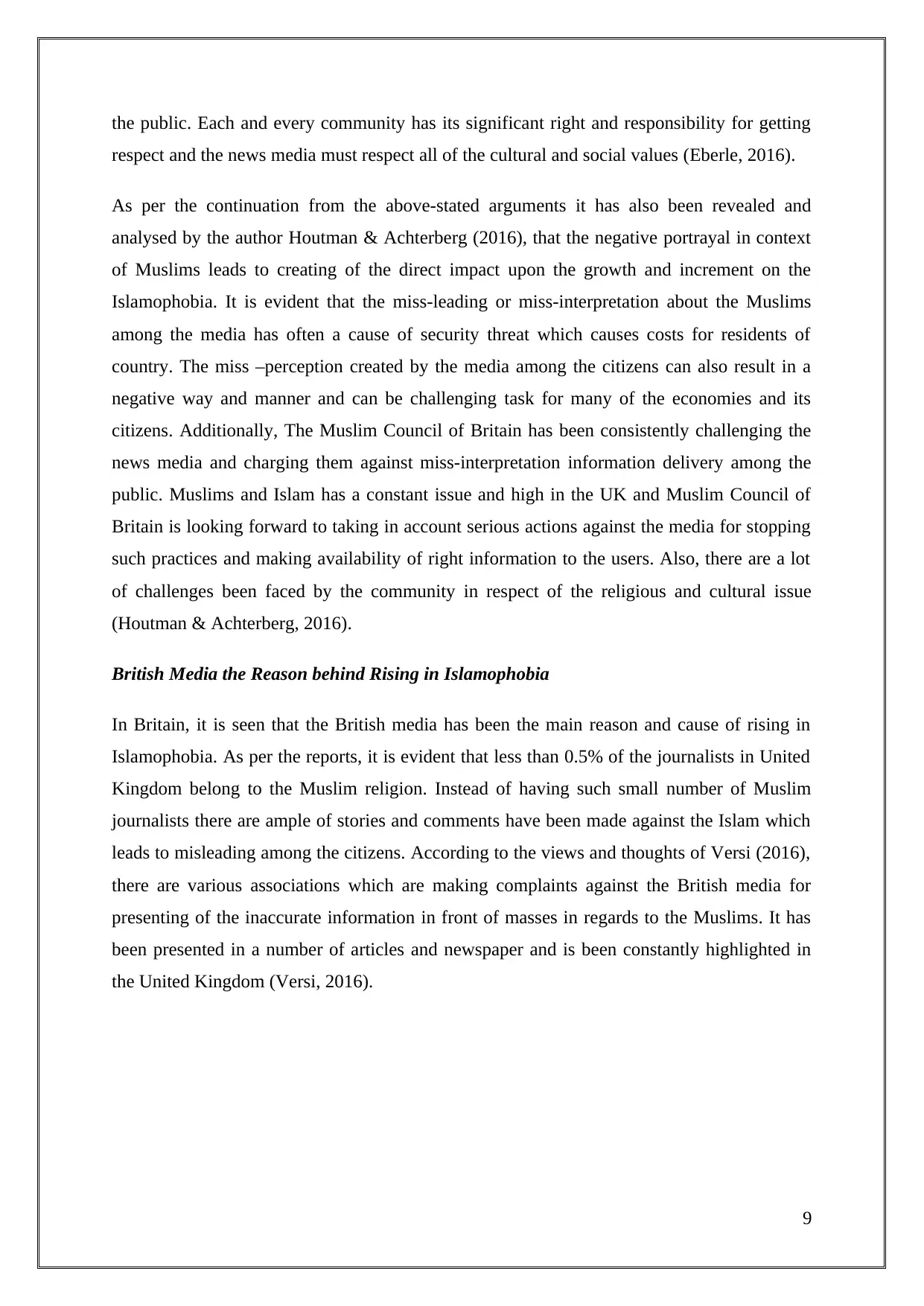
the public. Each and every community has its significant right and responsibility for getting
respect and the news media must respect all of the cultural and social values (Eberle, 2016).
As per the continuation from the above-stated arguments it has also been revealed and
analysed by the author Houtman & Achterberg (2016), that the negative portrayal in context
of Muslims leads to creating of the direct impact upon the growth and increment on the
Islamophobia. It is evident that the miss-leading or miss-interpretation about the Muslims
among the media has often a cause of security threat which causes costs for residents of
country. The miss –perception created by the media among the citizens can also result in a
negative way and manner and can be challenging task for many of the economies and its
citizens. Additionally, The Muslim Council of Britain has been consistently challenging the
news media and charging them against miss-interpretation information delivery among the
public. Muslims and Islam has a constant issue and high in the UK and Muslim Council of
Britain is looking forward to taking in account serious actions against the media for stopping
such practices and making availability of right information to the users. Also, there are a lot
of challenges been faced by the community in respect of the religious and cultural issue
(Houtman & Achterberg, 2016).
British Media the Reason behind Rising in Islamophobia
In Britain, it is seen that the British media has been the main reason and cause of rising in
Islamophobia. As per the reports, it is evident that less than 0.5% of the journalists in United
Kingdom belong to the Muslim religion. Instead of having such small number of Muslim
journalists there are ample of stories and comments have been made against the Islam which
leads to misleading among the citizens. According to the views and thoughts of Versi (2016),
there are various associations which are making complaints against the British media for
presenting of the inaccurate information in front of masses in regards to the Muslims. It has
been presented in a number of articles and newspaper and is been constantly highlighted in
the United Kingdom (Versi, 2016).
9
respect and the news media must respect all of the cultural and social values (Eberle, 2016).
As per the continuation from the above-stated arguments it has also been revealed and
analysed by the author Houtman & Achterberg (2016), that the negative portrayal in context
of Muslims leads to creating of the direct impact upon the growth and increment on the
Islamophobia. It is evident that the miss-leading or miss-interpretation about the Muslims
among the media has often a cause of security threat which causes costs for residents of
country. The miss –perception created by the media among the citizens can also result in a
negative way and manner and can be challenging task for many of the economies and its
citizens. Additionally, The Muslim Council of Britain has been consistently challenging the
news media and charging them against miss-interpretation information delivery among the
public. Muslims and Islam has a constant issue and high in the UK and Muslim Council of
Britain is looking forward to taking in account serious actions against the media for stopping
such practices and making availability of right information to the users. Also, there are a lot
of challenges been faced by the community in respect of the religious and cultural issue
(Houtman & Achterberg, 2016).
British Media the Reason behind Rising in Islamophobia
In Britain, it is seen that the British media has been the main reason and cause of rising in
Islamophobia. As per the reports, it is evident that less than 0.5% of the journalists in United
Kingdom belong to the Muslim religion. Instead of having such small number of Muslim
journalists there are ample of stories and comments have been made against the Islam which
leads to misleading among the citizens. According to the views and thoughts of Versi (2016),
there are various associations which are making complaints against the British media for
presenting of the inaccurate information in front of masses in regards to the Muslims. It has
been presented in a number of articles and newspaper and is been constantly highlighted in
the United Kingdom (Versi, 2016).
9
⊘ This is a preview!⊘
Do you want full access?
Subscribe today to unlock all pages.

Trusted by 1+ million students worldwide
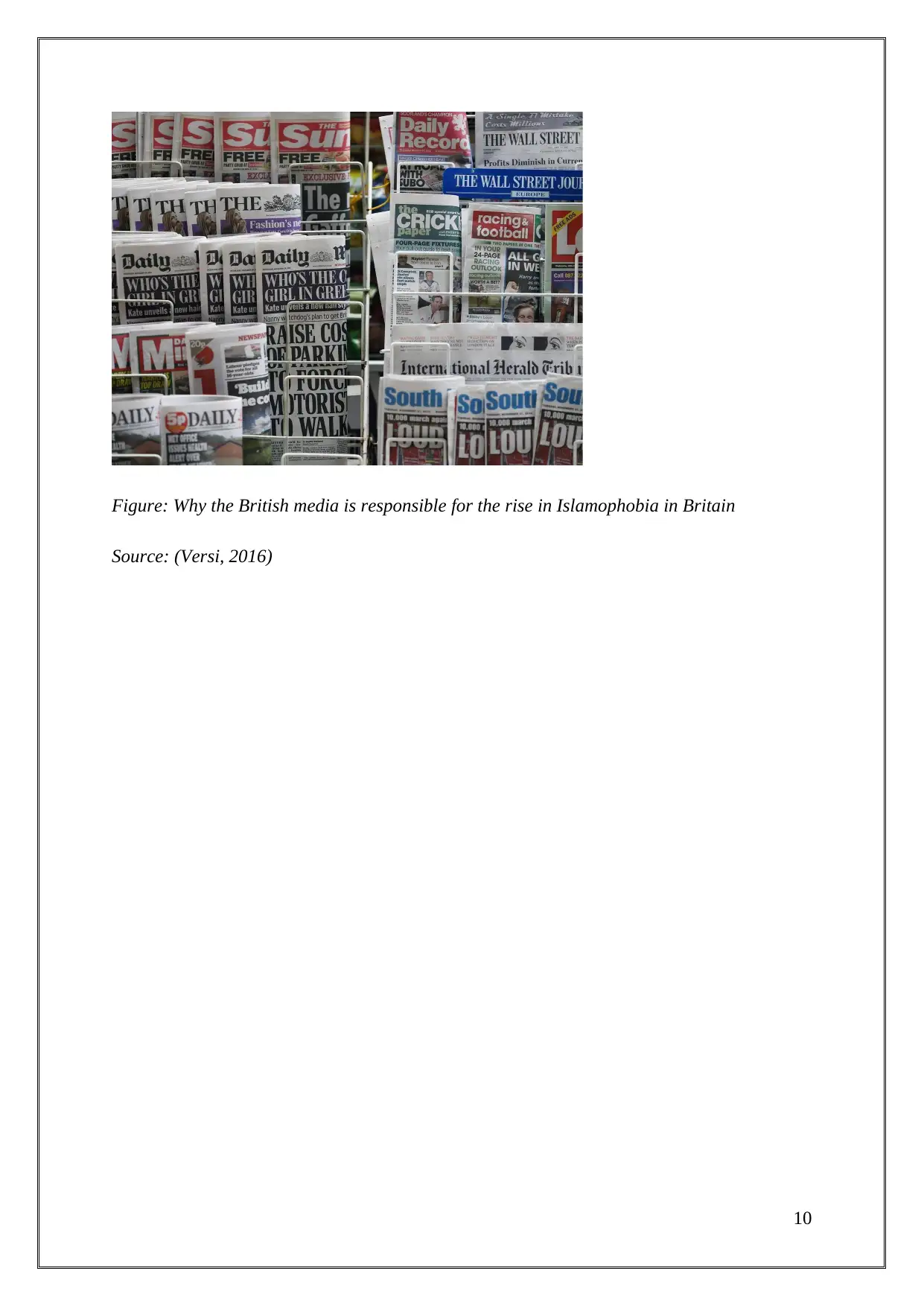
Figure: Why the British media is responsible for the rise in Islamophobia in Britain
Source: (Versi, 2016)
10
Source: (Versi, 2016)
10
Paraphrase This Document
Need a fresh take? Get an instant paraphrase of this document with our AI Paraphraser
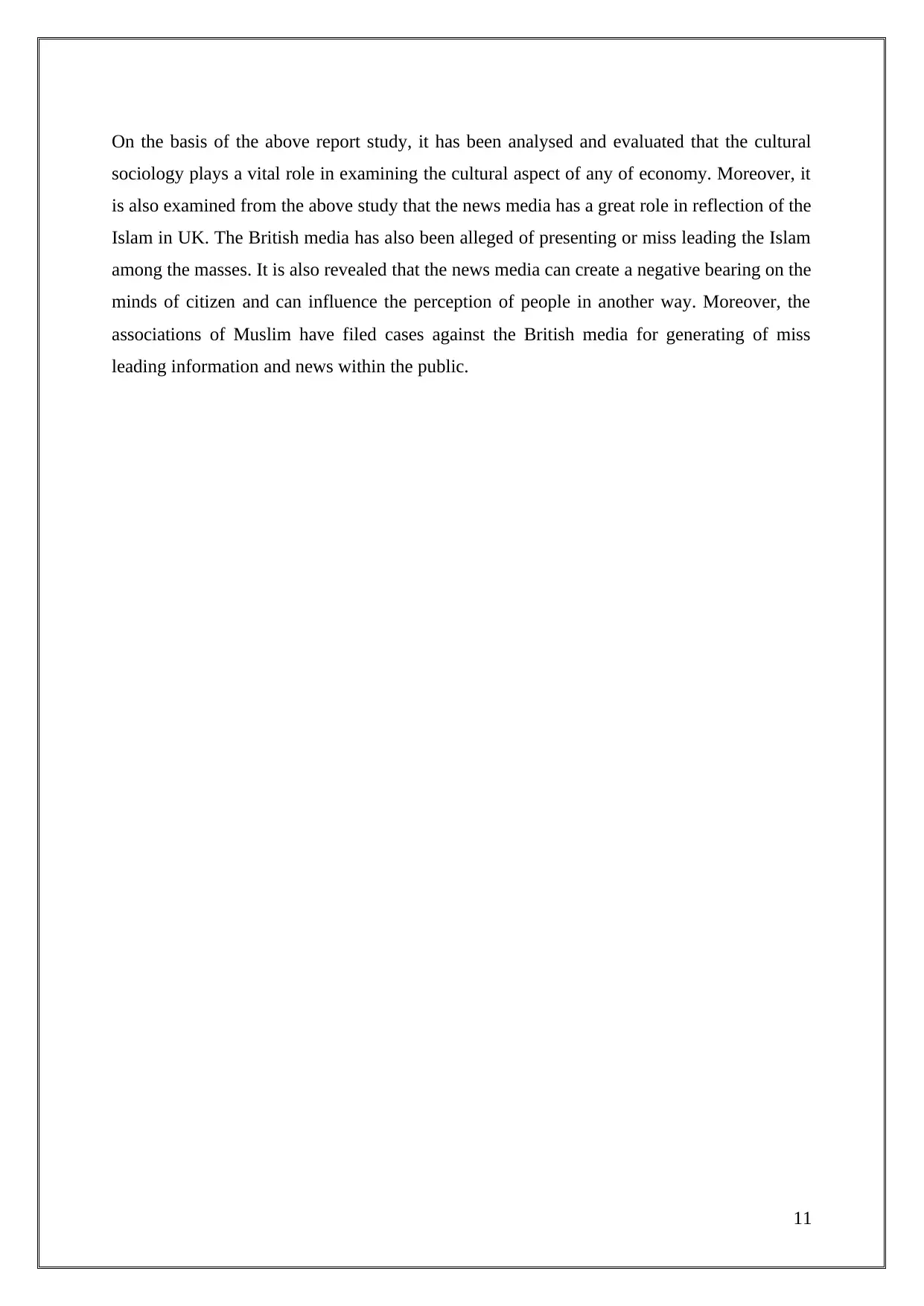
On the basis of the above report study, it has been analysed and evaluated that the cultural
sociology plays a vital role in examining the cultural aspect of any of economy. Moreover, it
is also examined from the above study that the news media has a great role in reflection of the
Islam in UK. The British media has also been alleged of presenting or miss leading the Islam
among the masses. It is also revealed that the news media can create a negative bearing on the
minds of citizen and can influence the perception of people in another way. Moreover, the
associations of Muslim have filed cases against the British media for generating of miss
leading information and news within the public.
11
sociology plays a vital role in examining the cultural aspect of any of economy. Moreover, it
is also examined from the above study that the news media has a great role in reflection of the
Islam in UK. The British media has also been alleged of presenting or miss leading the Islam
among the masses. It is also revealed that the news media can create a negative bearing on the
minds of citizen and can influence the perception of people in another way. Moreover, the
associations of Muslim have filed cases against the British media for generating of miss
leading information and news within the public.
11
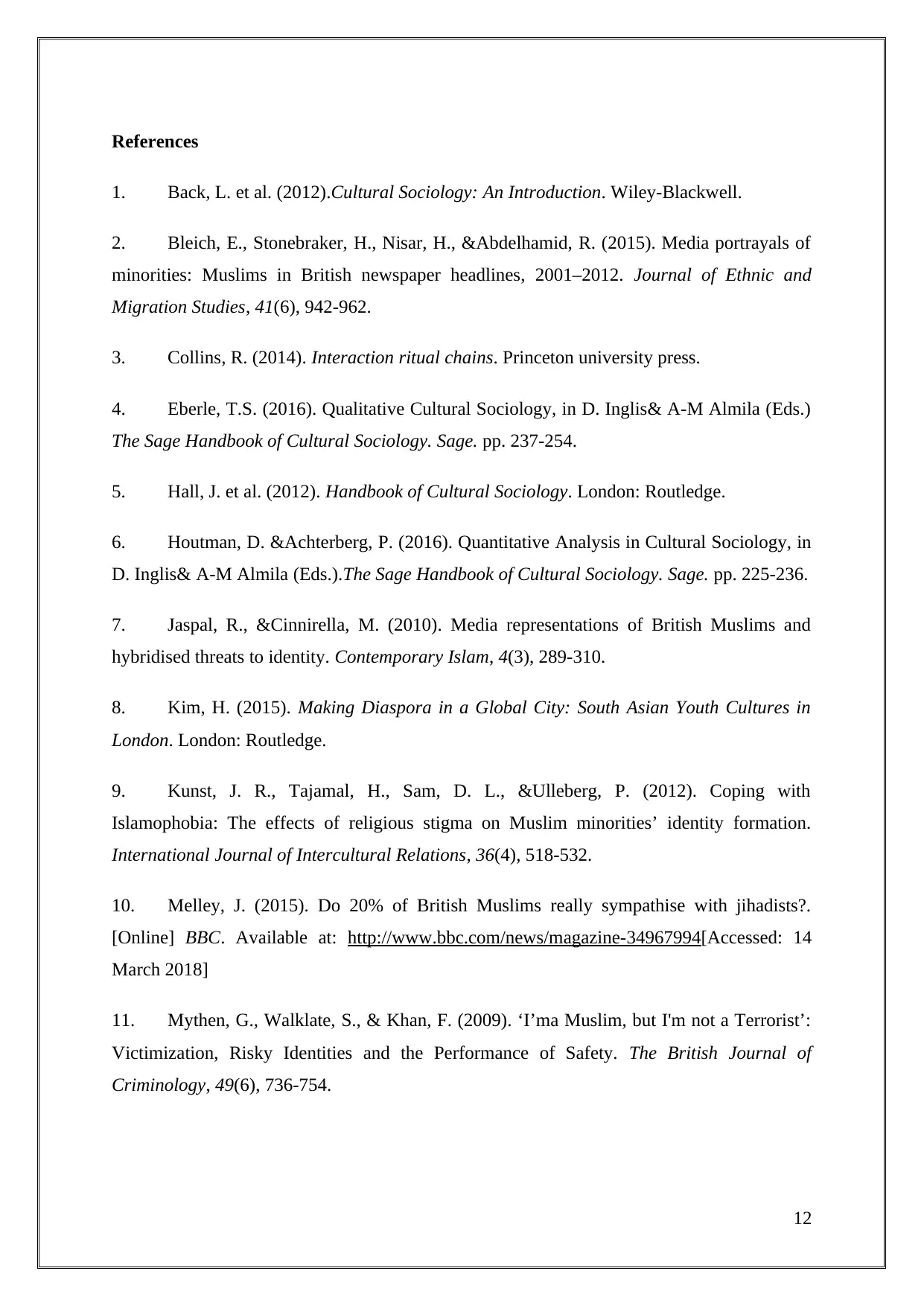
References
1. Back, L. et al. (2012).Cultural Sociology: An Introduction. Wiley-Blackwell.
2. Bleich, E., Stonebraker, H., Nisar, H., &Abdelhamid, R. (2015). Media portrayals of
minorities: Muslims in British newspaper headlines, 2001–2012. Journal of Ethnic and
Migration Studies, 41(6), 942-962.
3. Collins, R. (2014). Interaction ritual chains. Princeton university press.
4. Eberle, T.S. (2016). Qualitative Cultural Sociology, in D. Inglis& A-M Almila (Eds.)
The Sage Handbook of Cultural Sociology. Sage. pp. 237-254.
5. Hall, J. et al. (2012). Handbook of Cultural Sociology. London: Routledge.
6. Houtman, D. &Achterberg, P. (2016). Quantitative Analysis in Cultural Sociology, in
D. Inglis& A-M Almila (Eds.).The Sage Handbook of Cultural Sociology. Sage. pp. 225-236.
7. Jaspal, R., &Cinnirella, M. (2010). Media representations of British Muslims and
hybridised threats to identity. Contemporary Islam, 4(3), 289-310.
8. Kim, H. (2015). Making Diaspora in a Global City: South Asian Youth Cultures in
London. London: Routledge.
9. Kunst, J. R., Tajamal, H., Sam, D. L., &Ulleberg, P. (2012). Coping with
Islamophobia: The effects of religious stigma on Muslim minorities’ identity formation.
International Journal of Intercultural Relations, 36(4), 518-532.
10. Melley, J. (2015). Do 20% of British Muslims really sympathise with jihadists?.
[Online] BBC. Available at: http://www.bbc.com/news/magazine-34967994[Accessed: 14
March 2018]
11. Mythen, G., Walklate, S., & Khan, F. (2009). ‘I’ma Muslim, but I'm not a Terrorist’:
Victimization, Risky Identities and the Performance of Safety. The British Journal of
Criminology, 49(6), 736-754.
12
1. Back, L. et al. (2012).Cultural Sociology: An Introduction. Wiley-Blackwell.
2. Bleich, E., Stonebraker, H., Nisar, H., &Abdelhamid, R. (2015). Media portrayals of
minorities: Muslims in British newspaper headlines, 2001–2012. Journal of Ethnic and
Migration Studies, 41(6), 942-962.
3. Collins, R. (2014). Interaction ritual chains. Princeton university press.
4. Eberle, T.S. (2016). Qualitative Cultural Sociology, in D. Inglis& A-M Almila (Eds.)
The Sage Handbook of Cultural Sociology. Sage. pp. 237-254.
5. Hall, J. et al. (2012). Handbook of Cultural Sociology. London: Routledge.
6. Houtman, D. &Achterberg, P. (2016). Quantitative Analysis in Cultural Sociology, in
D. Inglis& A-M Almila (Eds.).The Sage Handbook of Cultural Sociology. Sage. pp. 225-236.
7. Jaspal, R., &Cinnirella, M. (2010). Media representations of British Muslims and
hybridised threats to identity. Contemporary Islam, 4(3), 289-310.
8. Kim, H. (2015). Making Diaspora in a Global City: South Asian Youth Cultures in
London. London: Routledge.
9. Kunst, J. R., Tajamal, H., Sam, D. L., &Ulleberg, P. (2012). Coping with
Islamophobia: The effects of religious stigma on Muslim minorities’ identity formation.
International Journal of Intercultural Relations, 36(4), 518-532.
10. Melley, J. (2015). Do 20% of British Muslims really sympathise with jihadists?.
[Online] BBC. Available at: http://www.bbc.com/news/magazine-34967994[Accessed: 14
March 2018]
11. Mythen, G., Walklate, S., & Khan, F. (2009). ‘I’ma Muslim, but I'm not a Terrorist’:
Victimization, Risky Identities and the Performance of Safety. The British Journal of
Criminology, 49(6), 736-754.
12
⊘ This is a preview!⊘
Do you want full access?
Subscribe today to unlock all pages.

Trusted by 1+ million students worldwide
1 out of 13
Your All-in-One AI-Powered Toolkit for Academic Success.
+13062052269
info@desklib.com
Available 24*7 on WhatsApp / Email
![[object Object]](/_next/static/media/star-bottom.7253800d.svg)
Unlock your academic potential
Copyright © 2020–2026 A2Z Services. All Rights Reserved. Developed and managed by ZUCOL.


